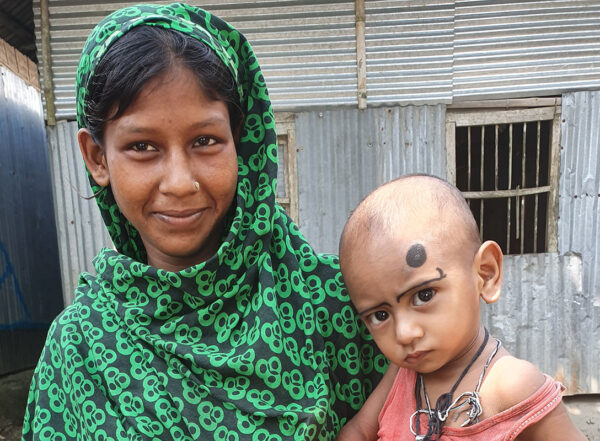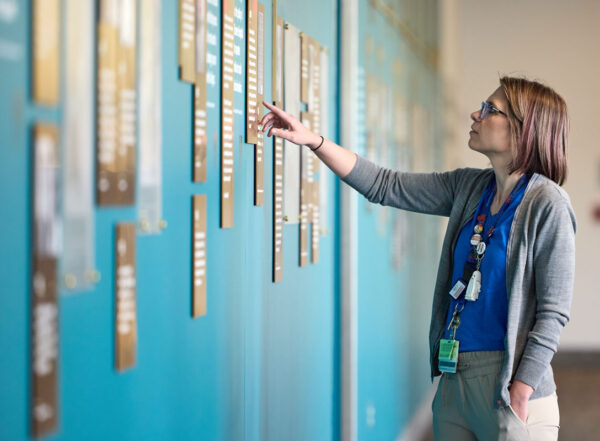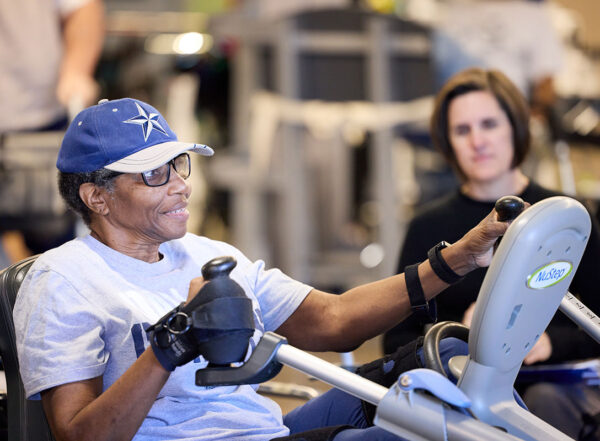Four medical students selected as Howard Hughes fellows
Students are among 68 nationwide selected for a year of mentored research training
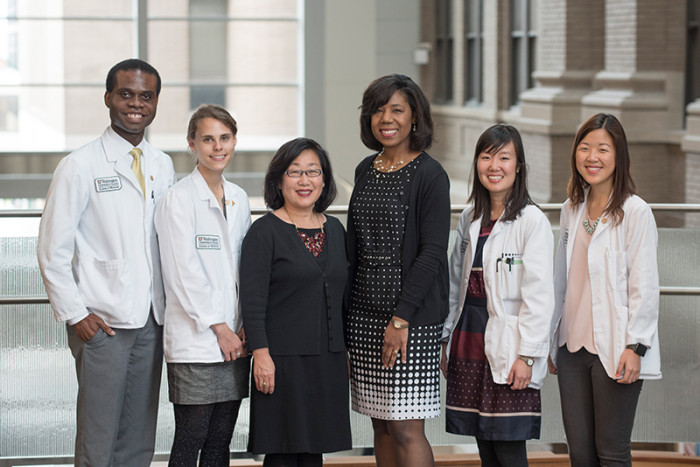 Robert Boston
Robert BostonPictured with Koong-Nah Chung, PhD, Associate Dean for Medical Student Research (center left), and Roz Robinson, Program Coordinator for the Office of Medical Student Research (center right), the fellowship recipients from Washington University are (from left) Kow Essuman, Julia Wagner, Amy Xu and Jessie Ge.
Four medical students at Washington University School of Medicine are among 68 students nationwide selected for the Howard Hughes Medical Institute’s Medical Research Fellows Program.
The $2.8 million annual initiative is designed to develop the next generation of physician-scientists by giving students a full year of mentored research training with some of the nation’s top biomedical scientists. Each student applied with a mentor of his or her choice and submitted a research proposal. Projects by Washington University students will investigate chronic itch, immune cells and cancer, nerve cell death and the promise of diagnostic nanoparticles in detecting disease.
The Howard Hughes Medical Institute is a science philanthropy aimed at advancing biomedical research and science education. The Medical Research Fellows Program has funded more than 1,600 students since it was established 26 years ago.
Third-year medical student and fellowship recipient Amy Xu will spend the year investigating molecular pathways that regulate eczema-associated itch. Her research mentor is former Howard Hughes fellow Brian Kim, MD, assistant professor of medicine.
Kim, who is co-director of the School of Medicine’s Center for the Study of Itch, said the fellowship had a profound influence on his medical career.
“As a medical student, I initially had not intended to go into research, and I was just trying it out,” Kim said of his own Howard Hughes fellowship. “Then I met probably the greatest mentor in my career, and it completely changed the course of what I was doing.”
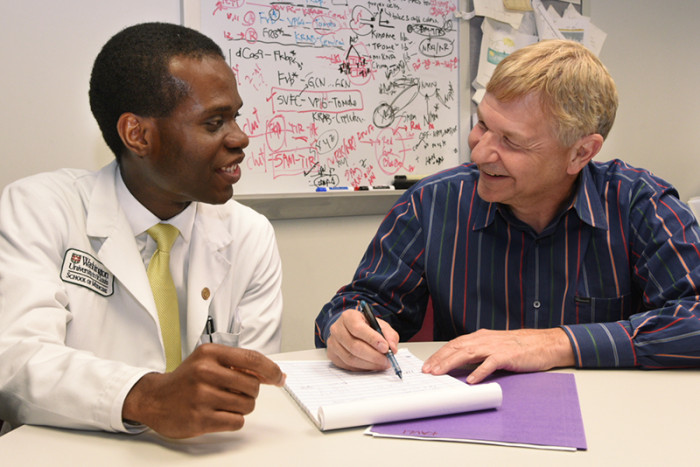 Robert Boston
Robert BostonWorking at the first comprehensive itch center in the country, Kim and his colleagues are developing targeted treatments for the millions of people worldwide affected by chronic itch. His patients travel to St. Louis from all over the country because their symptoms are so severe.
Koong-Nah Chung, PhD, associate dean of medical student research and director of the Office of Medical Student Research at Washington University, noted that the Howard Hughes fellowship enables students to conduct research under the leadership of highly regarded physician-scientists.
“The research here is so strong that every medical researcher is doing cutting-edge research,” Chung said. “All of our students end up working with stellar faculty members. Their exposure to research here is incredibly important to their careers.”
“It can transform your entire perspective as a medical student.”
– Todd Fehniger, MD, PhD,
describing student research
Second-year medical student Julia Wagner is working with research mentor Todd Fehniger, MD, PhD, also an alum of the Howard Hughes Medical Research Fellows Program. From basic science through clinical trials, Fehniger, an assistant professor of medicine, investigates ways to use the immune system to fight cancer by zeroing in on immune cells called natural killer, or NK, cells.
Fehniger said the research experience adds a crucial dimension to medical students’ coursework and clinical training.
“It’s one thing to read about an idea in a book,” he said, “but to actually sit down at the laboratory bench and see with your own eyes that you’re creating a cell that is better able to fight cancer changes your perspective. You get much more than a training experience; it can transform your entire perspective as a medical student.”
The school’s Office of Medical Student Research connects medical students – including the four Howard Hughes fellows – with research opportunities and funding. Among its goals: to encourage students to gain additional perspectives and to emphasize the connections between patient care and scientific research.
“Ideally, I’ll find a niche within my clinic work that my research will support,” Wagner said. “That can really double the impact of my training. I’ll be able to help people by treating them directly, while also making discoveries that help people I may never meet.”
Under Chung’s leadership, 95 percent of medical students completed research projects last year, with 23 percent in 1999. Chung and program coordinator Roz Robinson work with students to find faculty mentors and projects to match their interests and – perhaps most crucially – to secure funding for their research.
“We provide full funding for summer research here, so that’s $5,000 per student,” Chung explained. “Last summer, we pieced together 20 different funding sources to support all 100 medical students participating in summer research.”
In fact, all four students selected for the Howard Hughes fellowship previously participated in fully funded mentored research through the school’s Summer Research Program.
For the Howard Hughes fellowship, students put their medical coursework on hold to spend the year immersed in basic, translational or applied biomedical research. Three of the four students will be working toward their master’s degree in the combined Doctor of Medicine and Master of Arts (MA/MD) program, which is directed by Deborah Rubin, MD, professor of medicine.
Throughout the year, the students also have numerous enrichment opportunities through the fellowships, including attending scientific meetings and conferences.
“The program plugs you into a national scientific community,” Xu said. “I’m really excited for the unique opportunity to network with the fellow students, the alumni and potential future collaborators.”
Wagner, who balanced lab work with coursework during her second year of medical school, added that the fellowship allows her to dive deeper into research. “A year of just research and no classes is pretty rare. I’m looking forward to this time to just focus on the research.”
Meet the 2015-16 Howard Hughes fellows
The four students selected from Washington University represent one of the largest groups of Howard Hughes fellowship recipients at the School of Medicine.
Kow Essuman, third-year medical student
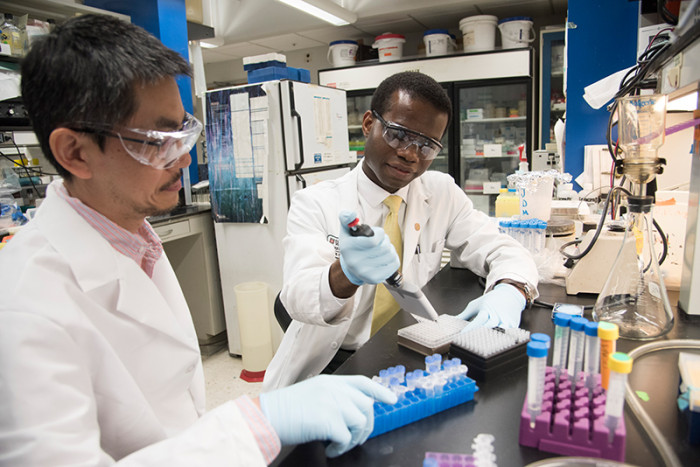 Robert Boston
Robert BostonKow Essuman will work with mentor Jeffrey Milbrandt, MD, PhD, the James S. McDonnell Professor and head of the Department of Genetics. Essuman’s project will focus on a specific mechanism of cell death in neurons.
“I’m very grateful for this opportunity,” Essuman said. “The fellowship will not only contribute to a greater knowledge of neuronal cell death, but it will also be a major step toward the identification of new therapeutic targets in neurodegenerative diseases, ultimately improving human health.”
Jessie Ge, second-year medical student
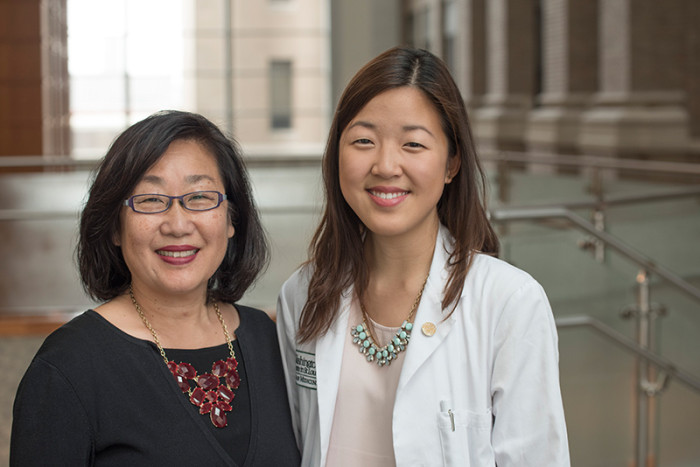 Robert Boston
Robert BostonJessie Ge will spend the year at Stanford University, where she’ll investigate the use of biomarker-detecting nanoparticles that could indicate – through a patient’s skin – the presence of disease. The technology could eliminate the need for repeated blood draws to detect or track some cancers.
“I’m thrilled to be able to continue my research training next year with an amazing mentor and to study such an exciting technology,” Ge said. She will be working with Sam Gambhir, MD, PhD, professor and chair of radiology at Stanford.
Julia Wagner, second-year medical student
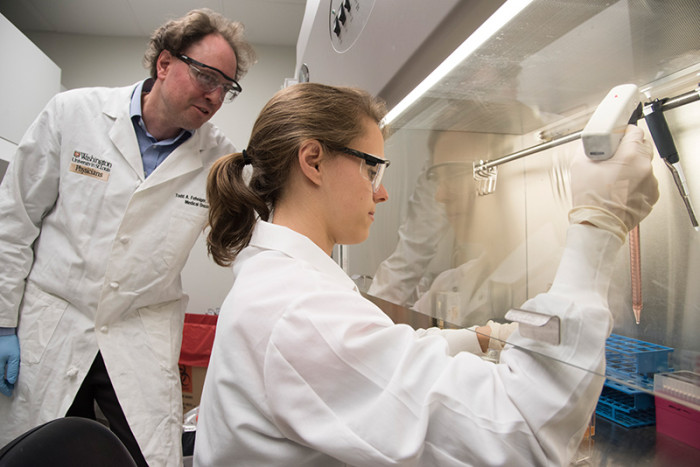 Robert Boston
Robert BostonFocusing on the cancer-fighting potential of a type of immune cell called natural killer (NK) cells, Julia Wagner will complete her year of research with Washington University physician-scientist and mentor Todd Fehniger, MD, PhD. Fehniger’s lab found that pre-activating human NK cells with molecules called cytokines makes them more responsive to tumor cells. Wagner will investigate the unique properties of these pre-activated NK cells, including their potential role in cancer immunotherapy.
Wagner said she gravitated to Fehniger’s lab because his research combines hematology, oncology and immunology – specialties that caught her interest in second-year classes – in a wet lab environment.
“His office is right here in the lab,” she pointed out, “so I can talk to him whenever I need to. It’s the perfect setting to learn a lot and to really learn quickly.”
Amy Xu, third-year medical student
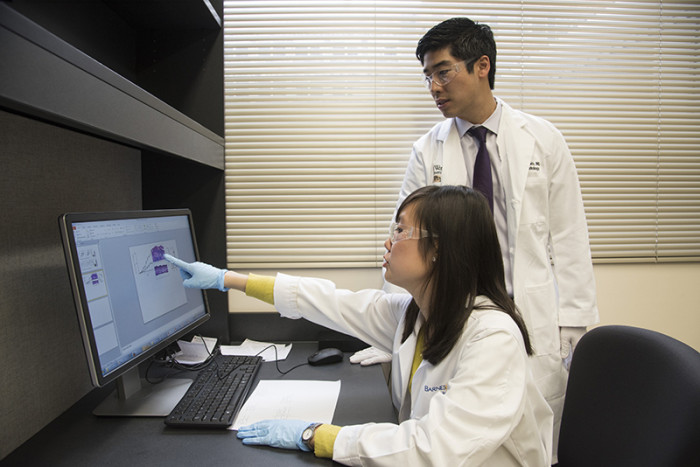 Robert Boston
Robert BostonWorking with faculty mentor Brian Kim, MD, Amy Xu will investigate the immune regulation of chronic pruritus, or itch, in eczema. She wants to investigate the role protein-signaling molecules called cytokines may play in provoking chronic itch. Xu’s research could help identify targets for eczema-associated itch therapy.
Kim’s lab will expose Xu to basic science and clinical research, and she looks forward to the interplay between the two. Xu added that the experience offers more than a lesson in research: “I’ve learned – by both observing and participating – how to write papers and how to make posters. I’ve watched (my mentors) manage their labs. I’ve watched them speak about science to an audience. So there’s a lot I can learn and that I’ve learned already from working with faculty mentors.”





